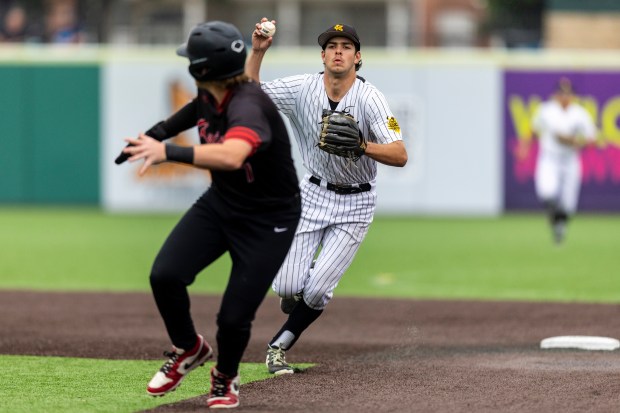Arguments attempting to throw out R. Kelly’s racketeering conviction were as broad and complicated as the criminal scheme he was found guilty of running – a scheme that, his attorney said, doesn’t meet the definition of a criminal enterprise at all.
There may have been evidence that the disgraced R&B star committed wrongdoing “using the quote-unquote machinery of his organization,” attorney Jennifer Bonjean argued Monday before the U.S. Second Circuit Court of Appeals in New York.
But there was not sufficient proof, she said, that the people working under Kelly “acted with common purpose to, quote, recruit women.”
“Just using unwitting individuals who perhaps even turned a blind eye or didn’t inquire further does not (make) a RICO enterprise exist,” she said.
Kelly, a Chicago native, was convicted in Brooklyn’s federal court on wide-ranging racketeering charges – commonly referred to as RICO charges – alleging he ran a decadeslong scheme leveraging his star power to systematically sexually abuse girls and women. He was sentenced to 30 years in prison and is currently serving his term in North Carolina, records show.
In response to Bonjean’s arguments, Assistant U.S. Attorney Kayla Bensing said there was plenty of evidence Kelly’s underlings knew they were enabling his illegal activities.
Members of his crew facilitated the bribery that got 15-year-old singer Aaliyah a fake ID so she could marry Kelly, Bensing said. At least two of Kelly’s employees testified that the singer’s female guests looked very young, and one victim who was approached by a member of Kelly’s entourage at a Chicago McDonald’s told him she was 16, Bensing said.
“This is all evidence that the jury was entitled to infer that Kelly’s inner circle knew what was going on,” Bensing said.
Monday’s arguments went well beyond the scheduled time.
When Bensing said she had gone over her allotted 10 minutes, the judges let her argument continue, with one of them saying, “There are a lot of issues here.” They then started peppering her with questions about allegations that Kelly knowingly transmitted herpes to two people without their consent.
During her rebuttal, Bonjean said that by prosecutors’ logic, many otherwise legal organizations could be deemed criminal if there are individual acts of sexual misconduct within them. A whole organization should not be considered an illegal enterprise just because one of its members committed crimes, she said.
“We have a lot of organizations, we have a lot of frat houses, we have all kinds of organizations that are now going to become RICO enterprises,” Bonjean said.
When she mentioned convicted financier Bernie Madoff, however, one of the judges cut her off.
“Well (Madoff) got 150 years, so I don’t think that it mattered,” the judge said.
The appellate judges did not render a decision Monday.
Kelly’s New York trial took place over nearly two months in 2021 and involved some 50 live witnesses.
Jurors ultimately found Kelly guilty of 12 individual criminal acts involving the racketeering scheme, including sex with multiple underage girls as well as the 1994 ploy to bribe an Illinois official to get a phony ID for Aaliyah.
In sentencing Kelly to 30 years, U.S. District Judge Ann Donnelly said the singer “left in (his) wake a trail of broken lives.”
“Although sex is certainly a weapon you used, this crime is not about sex; it’s about violence and cruelty and control,” she said, addressing Kelly. “You had a system in place that lured young people in your orbit and took over their lives.”
While the trial took place in New York, much of the evidence centered around Chicago, and testimony featured mentions of the old Rock ‘n’ Roll McDonald’s as well as Kelly’s suburban mansion in Olympia Fields.
Kelly went on trial in Chicago’s federal court in 2022 and was convicted on child pornography charges for explicit videos he made of himself and his then 14-year-old goddaughter, “Jane.” Kelly was also found guilty of inappropriate sexual relations with Jane and two other teenage girls, “Pauline” and “Nia.” The jury acquitted Kelly on separate charges of conspiring to rig his prior Cook County child pornography trial.
All but one year of Kelly’s 20-year term for the Chicago convictions is to be served concurrently with his New York sentence. The 57-year-old singer is not slated for release until 2045.
Kelly’s appeal of the Chicago conviction is pending. In arguments last month before the 7th Circuit Court of Appeals, Bonjean argued that some of his convictions should be thrown out on statute-of-limitations grounds, and that U.S. District Judge Harry Leinenweber did not have an appropriate basis for giving Kelly such a long sentence.
mcrepeau@chicagotribune.com
jmeisner@chicagotribune.com



